×
The Standard e-Paper
Stay Informed, Even Offline

It started all so quietly. Sweeping through like a silent wave in various parts of the country.
The dynamics of the Covid-19 pandemic continue to amplify it, so much so that the United Nations termed it a shadow pandemic. Physical and sexual violence against women has become rampant over the past year globally. Kenya has not been spared.